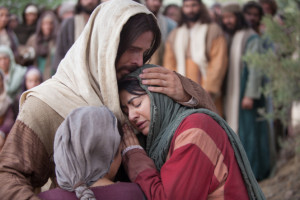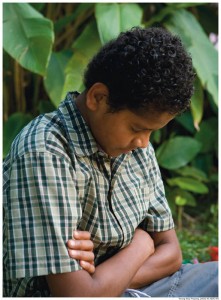Every one of us has what I call “Nephi moments.” You know, those times when we cry out in our hearts, “O wretched man [or woman] that I am.” We see our weaknesses and recognize our own failings and imperfections and feel almost overwhelmed. We find ourselves, too often, beating ourselves up for mistakes we’ve made and becoming more and more distressed with each mental “upside the head” smacking.
I was having one of those moments the other day during an early morning walk. I had both said and done something I knew was foolish beforehand, but I had done it anyway, and afterward I had reaped the consequence. As I walked, I raked myself over the coals and in the midst of the resulting distress, I cried out in my mind, “O dear Father. I’m sorry. I’m so weak. I continually do and say dumb things when I know better. Please forgive me! Please strengthen me! Please help me to overcome my weaknesses and imperfections.”
As those thoughts ran through my mind, a still small voice pierced through my internal rantings. “Yes, Randy, you are weak. But I am strong – lean on me.”
As you might imagine, like the Nephites when they heard Christ’s voice calling to them through the darkness that followed the upheaval and tumult that accompanied His death, I went silent in my mind. A feeling of peace came over me and the precious words from Ether 12:27 came flooding into my thoughts:
And if men come unto me, I will show them their weakness. I give unto men weakness that they may be humble; and my grace is sufficient for all men that humble themselves before me, and have faith in me, then will I make weak things become strong unto them.
Those words gave me cause to think about what it means to be humble. In reflecting on several recent challenging situations, I realized how my own lack of humility had blocked the influence of the Holy Ghost in my life and prevented me from being as effective as I needed to be – as God needed me to be. I recognized my need to humble myself, repent, and learn from this experience so that in the future, with the Lords’ help, with His empowering grace, I can do better.
My heart swelled with gratitude to know that, despite my weakness, the Lord was still mindful of me and willing to help me, once I put myself in a position for Him to do so. I just had to recognize the need I have to be much humbler and to rely on His ample arm and eternal grace if I am to be truly successful and be and effective instrument in His hands.
As I continued walking I listened to a talk by President Faust from October 2001 entitled The Atonement: Our Greatest Hope. In that wonderful talk he retold a story that had previously been shared by President Hinckley. It touched my heart deeply and drove home how it is that Jesus fully understands and knows how to succor us in our weakness. The following excerpt is taken directly from President Hinckley’s telling of the story as published in the First Presidency Message in the December 2000 Ensign under the title The Wondrous True Story of Christmas.
Years ago there was a little one-room schoolhouse in the mountains of Virginia where the boys were so rough that no teacher had been able to handle them.
A young, inexperienced teacher applied, and the old director scanned him and asked: “Young fellow, do you know that you are asking for an awful beating? Every teacher that we have had here for years has had to take one.”
“I will risk it,” he replied.
The first day of school came, and the teacher appeared for duty. One big fellow named Tom whispered: “I won’t need any help with this one. I can lick him myself.”
The teacher said, “Good morning, boys, we have come to conduct school.” They yelled and made fun at the top of their voices. “Now, I want a good school, but I confess that I do not know how unless you help me. Suppose we have a few rules. You tell me, and I will write them on the blackboard.”
One fellow yelled, “No stealing!” Another yelled, “On time.” Finally, ten rules appeared on the blackboard.
“Now,” said the teacher, “a law is not good unless there is a penalty attached. What shall we do with one who breaks the rules?”
“Beat him across the back ten times without his coat on,” came the response from the class.
“That is pretty severe, boys. Are you sure that you are ready to stand by it?” Another yelled, “I second the motion,” and the teacher said, “All right, we will live by them! Class, come to order!”
In a day or so, “Big Tom” found that his lunch had been stolen. The thief was located—a little hungry fellow, about ten years old. “We have found the thief and he must be punished according to your rule—ten stripes across the back. Jim, come up here!” the teacher said.
The little fellow, trembling, came up slowly with a big coat fastened up to his neck and pleaded, “Teacher, you can lick me as hard as you like, but please, don’t take my coat off!”
“Take your coat off,” the teacher said. “You helped make the rules!”
“Oh, teacher, don’t make me!” He began to unbutton, and what did the teacher see? The boy had no shirt on, and revealed a bony little crippled body.
“How can I whip this child?” he thought. “But I must, I must do something if I am to keep this school.” Everything was quiet as death.
“How come you aren’t wearing a shirt, Jim?”
He replied, “My father died, and my mother is very poor. I have only one shirt and she is washing it today, and I wore my brother’s big coat to keep me warm.”
The teacher, with rod in hand, hesitated. Just then “Big Tom” jumped to his feet and said, “Teacher, if you don’t object, I will take Jim’s licking for him.”
“Very well, there is a certain law that one can become a substitute for another. Are you all agreed?”
Off came Tom’s coat, and after five strokes the rod broke! The teacher bowed his head in his hands and thought, “How can I finish this awful task?” Then he heard the class sobbing, and what did he see? Little Jim had reached up and caught Tom with both arms around his neck. “Tom, I’m sorry that I stole your lunch, but I was awful hungry. Tom, I will love you till I die for taking my licking for me! Yes, I will love you forever!”
Tears flowed freely down my face as I contemplated the “licking” that Jesus Christ was willing to take for me—for all of us. Truly, as taught by Isaiah and recorded in Isaiah 53:4-5:
… He hath borne our griefs, and carried our sorrows. …
… He was wounded for our transgressions, he was bruised for our iniquities: the chastisement of our peace was upon him; and with his stripes we are healed.
In thinking of Christ’s sacrifice, I couldn’t help asking myself, though I knew the answer, “How is Christ able to help our weaknesses become strengths?” I was reminded that He is able to do so because he has experienced every one of them! In Alma 7:12 we read:
And he will take upon him death, that he may loose the bands of death which bind his people; and he will take upon him their infirmities, that his bowels may be filled with mercy, according to the flesh, that he may know according to the flesh how to succor his people according to their infirmities.
The Lord has passed through, and overcome, every trial or challenge that any of us can face. He is therefore perfectly equipped to help us to do the same as long as we are willing to do our part by coming unto Him in humility and exercising our faith.
Further along in my walk, as I continued pondering on these things, another question came into my mind. “How can I exercise the needed faith to access His enabling grace?” Again, I already knew the answer, but like everyone else, I needed a reminder. That reminder came in the very next talk I listened to from the same October 2001 General Conference. Elder L. Witney Clayton gave a masterful discourse entitled, Help Thou Mine Unbelief. In his marvelous message Elder Clayton shared the formula for continually accessing Christ’s amazing grace:
No matter who we are or where we live, there is much about our daily lives that is routine and repetitive. As we go about this dailiness, we must be deliberate about doing the things that matter most. These must-do things include making room for minimum daily requirements of faithful behavior: true obedience, humble prayer, serious scripture study, and selfless service to others. No other daily vitamins strengthen the muscles of our faith as fast as these actions. We must also remember that genuine fasting fosters strong faith.
To reiterate—to access Christ’s enabling grace, we must:
- Be obedient to His commandments
- Pray humbly
- Study the scriptures seriously
- Selflessly serve others
- Fast genuinely and meaningfully
My heart was full that day as I returned home. It is full now as I’ve relived those events in my mind. I know that God and Jesus Christ live and that they love us. I want to obey them and be worthy of the enabling grace available because of Christ’s Atonement.
May the Lord bless each of us with the humility and faith to accept His gracious invitation to come unto Him that we might receive the wonderful strength and blessings He desires to give us.
About Randall McNeely
Randall McNeely is a husband, father of five, and author. He is also a singer/songwriter and has written several patriotic songs, children’s songs, and multiple religious hymns. The best known is 'Oh Jesus, Savior of Mankind', which won a Special Recognition award in The Church of Jesus Christ of Latter-Day Saints 2008 Music Submission contest. He and two of his daughters have also recorded and released the children’s song Everybody Speaks Smile!
Randy has a firm testimony of Jesus Christ. He is the light and the life of the world. It is said and written of Him that "He went about doing good." In doing so, He weaved light into the hearts and souls of all with whom He came in contact, both in word and deed. Randy's desire is to have the same said of him. He wants to have the words and lyrics he writes uplift, inspire, and bless others. To read more articles by Randy visit his Pure Testimony website at www.puretestimony.org.
Twitter •





thank you for sharing this article! The story was very touching. When I think about the Savior taking our lickings I think about how incredible the love He has for us is. How He knows us completely and understands our weaknesses and loves us all the more for them. I think about the word “succor”
From Webster’s 1828 dictionary, the word succor means, “Literally, to run to, or run to support; hence, to help or relieve when in difficulty, want or distress; to assist and deliver from suffering.”
This gives us a sense of the urgency which the word implies. It’s not merely to reach out and comfort someone, but as soon as we see a need, we run to and meet that need.
Christ succors us in many ways and in a ways including taking our lickings for us. He runs to our rescue like Tom did for jim and jim did for tom in the end.
I believe as we succor one another our weaknesses can become strengths as well.
Here’s another great article on succoring the weak and needy.
https://scripturenotes.com/succor-the-weak-and-needy
Hi Aspen,
Thank you for your kind and wonderful comment. I’m glad you enjoyed the article and that it was of help to you.
Thank you too for your wonderful insights on the word “succor” and for sharing your thoughts. I appreciate you.
Finally, thanks for the link to the additional article.
Hang on tight for the ride right now. God is there and aware of what is happening.